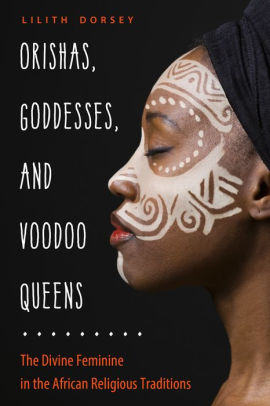Lilith Dorsey is very enthusiastic about the divine feminine in African Religious Traditions (ATR) and more broadly in the Americas. These diasporic religions with African roots are historically linked and while they do have some commonalities, they have different beliefs, mythologies, and practices. It would probably help the reader to already know some basics because Orishas, Goddesses and Voodoo Queens is not going to spell it out for you. Lilith Dorsey decided to showcase the feminine divine with chapters focusing on some female orishas, female lwa, the voodoo queen Marie Laveau, the mermaid La Sirene of vodou, the perhaps mythological Annie Christmas, a nod to Brazil with Pomba Gira and even a section on the Mexican Santa Muerte. The organization of this book hinges on the reader being interested in the divine feminine in ATR but then rambles into much wider territory geographically and culturally speaking, leading to a looser thesis that may confuse readers who have very little knowledge to begin with.
On the positive side, the information that is presented is consistent with other sources. It appears to be factually accurate to the extent that a mostly oral tradition can be. The author enjoys talking about the topic and she provides easy to follow directions for the recipes, prayers, spells and other activities that she recommends to get to know these divine beings and worship them. Feminist readers will appreciate the attention on strong, independent, female divine beings. There is a much stronger female presence in ATR than there are in Abrahamic religions but the stories of these divine beings are always within a mixed gender, familial and community context. This book stands alone in presenting the African female divine on their own. Depending on your viewpoint, this is either fantastic, or strangely divorced from the mixed gender context of the actual practitioners of ATR.
My biggest critique is the lack of focus. Initially Dorsey even intended to include a chapter on a European goddess and thankfully nixed that. Even so, the inclusion of Santa Muerte, with its Mexican-Aztec roots, is distracting. Additionally, I think as a primer, or gateway, the mix of the female divine from Lucumi, New Orleans Voodoo, Voudon and Candomblé without a solid intro to their distinct beliefs, structure and myth, is likely to leave some readers with an even more syncretic vision of ATR than what these paths already are. Dorsey does advise that those who wish to pursue this further will need to find teachers and initiation. The question would be which one and would require far more information to decide than this primer gives.
Published 2020
Recommended for those whose focus is on the female divine and who want to gain some understanding of this in African religion with the possibility of including some basic worship in an eclectic magical path.
Not recommended if the reader wants a traditional approach and a comprehensive intro to a specific ATR path.
~review by Larissa Carlson
Author: Lilith Dorsey
Publisher: Red Wheel/Weiser Books
pp. 242, $ 16.95
Orishas, Goddesses and Voodoo Queens: The Divine Feminine in the African Religious Traditions

©
2010 - 2025
Facing North
